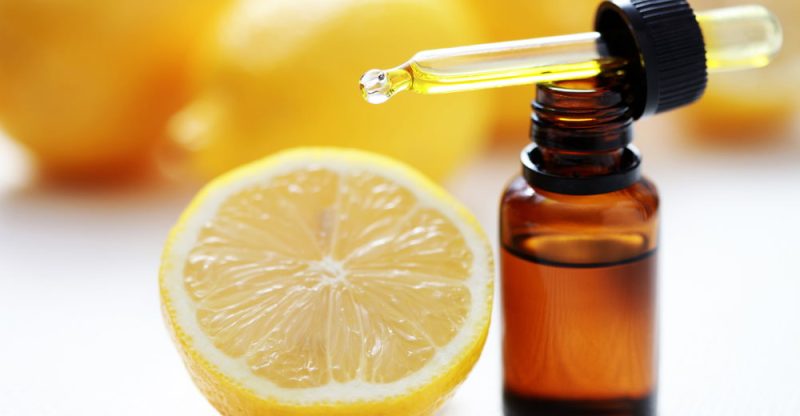Lemon Essential Oil Benefits, Uses and Side Effects
Lemon essential oil is a natural, limonene-containing oil that smells of citrus and has many uses. Detailed information about its benefits and how to use it yourself can be found below in this blog post.
Lemons and lemon essential oil have been utilized in Ayurvedic medicine for at least 1,000 years to cure various ailments.
Because of their many applications in food and medicine, citrus trees are the primary producers of beneficial essential oils. Because of its flexibility and potent antioxidant effects, lemon oil is one of the most popular citrus essential oils.
The lemon essential oil has been scientifically shown to offer several health advantages. Lemon is most recognized for its capacity to remove toxins from the body, but it’s also used to promote lymphatic drainage, boost energy, cleanse the skin, and combat germs and fungus.
One of the most “important” oils to keep on hand is lemon oil. It may be used for various things, including tooth whitening, cleaning, laundry freshening, mood-boosting, and nausea relief.
With only one bottle of this essential oil, you can cover a lot of lands.
What Is Lemon Essential Oil?
Lemon is a flowering plant that belongs to the Rutaceae family and is formally known as Citrus limon. Lemon plants are produced in many nations across the globe, even though they are native to Asia and are thought to have arrived in Europe about the year 200 A.D.
English sailors utilized lemons to defend themselves against scurvy and other bacterial diseases while at sea in America.
The lemon peel, not the interior fruit, is used to extract the essential oil. Because of its fat-soluble phytonutrients, the peel is the most nutrient-dense part of the lemon.
According to research, lemon essential oil contains a variety of natural components, including:
- terpenes
- sesquiterpenes
- aldehydes
- alcohols
- esters
- sterols
Lemons and lemon oil are famous for their energizing, purifying, and cleansing capabilities and their delightful aroma. In addition, lemon oil has been shown in studies to possess potent antioxidants that help decrease inflammation, combat germs and fungus, increase energy, and improve digestion.
Benefits
1. Helps with Nausea
If you’re seeking a natural and efficient solution to getting rid of nausea, particularly if you’re pregnant and suffering morning sickness, the lemon essential oil is a great option.
The impact of lemon inhalation on nausea and vomiting during pregnancy was explored in 2014 double-blind, randomized, and controlled critical study. A total of 100 pregnant women suffering from nausea and vomiting were split into intervention and control groups, with the intervention group inhaling lemon essential oil as soon as they felt unwell.
Researchers discovered a statistically significant difference in mean nausea and vomiting ratings between the control and intervention groups, with the lemon oil group having significantly lower levels. This implies that lemon essential oil may be utilized to alleviate nausea and vomiting in pregnant women.
Research published in 2020 revealed that mixing lemon and peppermint essential oils reduced mild to moderate symptoms of nausea and vomiting during pregnancy, particularly after two to four days of treatment. Participants breathed the scent of cotton balls in the research, but utilizing a diffuser is also a terrific method to utilize oils aromatically.
2. Helps with digestion
The lemon essential oil may aid with various digestive ailments, including gastritis and constipation.
According to a 2009 animal research published in Chemical and Biological Interactions, Lemon essential oil improved gastritis symptoms in rats by lowering the erosion of gastric mucosa (the lining of the stomach) and acting as a gastro-protective agent against stomach legions.
Another 10-day randomized control trial was conducted to see whether lemon, rosemary, and peppermint essential oils may help older people with constipation. According to the researchers, the aromatherapy group, which got abdominal massages using essential oils, had considerably lower constipation evaluation ratings than the control group.
They also discovered that the experimental group had a larger number of bowel motions. Participants in the essential oil group had natural constipation alleviation for two weeks following therapy.
3. Nourishes the skin
Lemon essential oil is good for your skin since it reduces acne, nourishes damaged skin, and hydrates it. In addition, lemon oil has been shown in lab experiments to minimize free radical-induced cell and tissue damage in the skin. This is because lemon oil has significant antioxidant and anti-aging properties.
Lemon essential oil is also effective against skin issues such as blisters, insect bites, greasy and oily conditions, cuts, wounds, cellulite, rosacea, and viral infections of the skin such as cold sores and warts, according to a scientific review published in Evidence-Based Complementary and Alternative Medicine. This is because the antibacterial components in the lemon oil help to cure dermatological disorders naturally.
4. it may help you lose weight
Did you know that lemon essential oil might aid in the breakdown of fat in the body? Lemon includes d-limonene, which is similar to grapefruit oil, which is one of the greatest essential oils for weight reduction.
D-limonene has been shown to aid in metabolism and lymphatic gland cleansing. This might aid with weight reduction.
When mice were supplemented with lemon polyphenols extracted from lemon peel for 12 weeks, their body weight gain, fat pad accumulation, and development of hyperlipidemia, hyperglycemia, and insulin resistance were significantly reduced, according to a study published in the Journal of Clinical Biochemistry and Nutrition.
5. Assists in the body’s purification
Lemon oil has a purifying, cleaning, and protecting function on the body. It aids in the body’s defense against dangerous germs and promotes blood and liver cleansing.
The lemon essential oil also aids lymphatic drainage—this aids in the removal of wastes and poisons from the body.
When rats with aspirin-induced acute liver and kidney damage were given lemon essential oil, the oxidative stress and damage to both organs were reduced, according to 2016 animal research.
Another animal research looked at how lemon oil and other essential oils affected the antioxidant status of mice’s organs. Mice given essential oils for six months were able to lower oxidative stress while maintaining their organs’ structural integrity and functional functioning, even at extremely low dosages.
On the liver and brain of mice, a blend of lemon essential oil and ginger extract exhibited the most antioxidant effect.
6. It Improves Oral Health
Lemon essential oil is a natural cure for various oral problems, including oral thrush and foul breath, due to its antibacterial and antifungal qualities. It may also be used to whiten your teeth and protect them from decay naturally.
The effectiveness of lemon juice in oral thrush treatment was studied in a randomized controlled experiment including 90 HIV/AIDS patients. As a result, the efficacy of lemon juice to cure oral thrush in an HIV-positive population was discovered to be verified by researchers.
Although citrus liquids are notorious for their acidic nature, which may cause tooth erosion over time, essential oils do not seem to induce the same acid erosion. Nonetheless, the research findings suggest that citrus essential oils should not be utilized in mouth rinses for long periods or as a pre-brush rinse.
7. Cough Relief and Lymphatic Drainage Stimulation
Lemon oil contains antibacterial, antioxidant, and anti-inflammatory qualities. Thus it may aid your immune system and battle respiratory problems. It’s also one of the most effective essential oils for allergies.
Because it improves the lymphatic system, it’s one of the greatest essential oils for coughs. This shields you from dangerous infections and lowers lymph node swelling.
The lemon essential oil has been found to suppress pro-inflammatory mediators, reducing inflammation and perhaps increasing lymphatic drainage. This may assist in reducing the buildup of fluids that cause coughing.
8. It has antimicrobial properties
Because of two major components contained in the oil, limonene and b-pinene, the lemon essential oil has been shown to function as a natural antimicrobial agent in studies. As a result, lemon oil is an effective cleaning and food preservation agent.
Lemon oil may be used to rid your house of diseases such as bacteria, fungus, and other microorganisms. Using lemon as a natural cleaning agent also keeps your house free of harmful chemicals found in traditional cleaning products.
According to research, lemon oil may also be utilized to help safeguard our food chain. For example, researchers discovered that lemon oil prevented the development of germs in minced beef meat in a trial assessing its preservation properties.
Lemon essential oil inhibited the growth of Listeria monocytogenes, suggesting that it may aid in the avoidance of contamination in our food supply. This is beneficial to our food system since germs linked to foodborne sickness have been linked to bacteria such as Listeria monocytogenes, Salmonella, Staphylococcus aureus, and Escherichia coli.
9. It has the potential to act as an anti-tumor agent
Anti-tumor and chemotherapeutic benefits of limonene, a primary component of lemon essential oil, have been shown in animal experiments. Oral administration of lemon oil has resulted in considerable mammary carcinoma (breast cancer) regression with no evidence of systemic harm.
According to animal studies, using citrus oils containing limonene topically may also be a safe and realistic alternative for helping women avoid breast cancer, but further study is required.
How to Use
Lemon oil has a long range of purposes, so I believe it’s one of the best essential oils to have on hand. Here are a few of my personal favorites:
1. Disinfectant made from natural ingredients
You don’t want to use alcohol or bleach to clean your moldy shower or disinfect your worktops. Instead, for a classic cleaning favorite, combine 40 drops of lemon oil and 20 drops of tea tree oil in a 16-ounce spray bottle filled with pure water (and a little white vinegar).
This natural cleaning solution may be used to remove toxins and germs from your house, particularly in the kitchen and bathroom.
2. Doing the laundry
If you ever leave your clothing in the washing for an extended period, just add a few drops of lemon essential oil to the load before drying to avoid a musky odor.
3. Silver and Wood Polish
A towel soaked in lemon oil (approximately 10 drops of oil) may be used to polish tarnished metal and jewelry. Lemon oil may be used to clean wood as well.
4. Detergent for Dishwashers
To keep your dishes clean without the chemicals found in commercial detergents, use my Homemade Dishwasher Detergent with orange and lemon essential oils.
5. Goo
Lemon oil may be used to remove the sticky goo left behind by your children’s stickers and gum. 3–5 drops of lemon oil in a moist washcloth is all it takes.
6. Keep Your Hands Clean
Working on your vehicle or bike has left your hands filthy, and standard soap isn’t cutting it? Just combine a few drops of lemon essential oil with your soap to reclaim your clean hands!
7. Whitening toothpaste
Rub a mixture of lemon essential oil, baking soda, and coconut oil on your teeth for two minutes before washing.
8. Wash your face
The lemon essential oil may be used to enhance the appearance of your skin and leave it smooth and silky. Use my Lemon, Lavender, and Frankincense Oil Face Wash, or just blend 2–3 drops of lemon oil with baking soda and honey.
9. Nail polish remover
Make your own nail polish remover using citrus essential oils such as lemon, grapefruit, and sweet orange. It not only removes your old nail paint but also acts to safeguard the health of your nails.
10. Encourage fat loss
To stimulate your metabolism and encourage weight reduction, add 2 drops of lemon oil to a glass of water 2–3 times per day.
11. Make Your Mood Better
Diffusing 5 drops of lemon essential oil around your home or office will help you feel better and battle depression.
12. Immune System Boost
Mix 2–3 drops of lemon essential oil with a half teaspoon of coconut oil and massage it into your neck to improve your immune system, destroy germs, and assist your lymphatic system.
13. Cough Relief
Diffuse 5 droplets of lemon oil at home or at work, blend 2 drops with a half teaspoon of coconut oil and massage it into your neck, or add 1–2 drops of a high-quality, pure-grade oil to warm water with honey as a cough treatment.
14. Clears mucus and phlegm
Inhale lemon oil straight from the bottle to help remove mucus and alleviate congestion, or mix 2–3 drops with a half-teaspoon of coconut oil and apply topically to your chest and nose.
15. Relieve Symptoms of Allergies
Diffuse 5 drops of lemon oil at home, add 5 drops to your laundry detergent, or combine 5–10 drops with water in a spray bottle and spray it on your carpets, curtains, sofas, and linens to help empty your lymphatic system and reduce seasonal allergy problems.
16. Make Nausea Go Away
Inhale lemon oil straight from the bottle, diffuse 5 drops at home or work, or mix 2–3 drops with a half-teaspoon of coconut oil and apply topically to your temples, chest, and back of neck to treat nausea and vomiting.
17. Make your digestion better
Add 1–2 drops of a good-quality, pure-grade lemon essential oil to a glass of cold water or warm water with honey twice a day to relieve digestive symptoms, including gassiness or constipation.
18. Encourage the detoxification of the body
Add 1–2 drops of a high-quality, pure-grade lemon essential oil to a glass of water twice a day to help detoxify your body, boost detoxification, and eliminate dangerous toxins that may contribute to illness.
Side Effects and Risks
When used topically, lemon essential oil might induce photosensitivity, so avoid direct sunlight for at least 12 hours after applying it to your skin.
Lemon oil might irritate some people’s skin, so conduct a patch test on your arm or leg before using it topically to be sure you don’t have an allergic response. Also, it’s advisable to dilute lemon oil with a carrier oil like coconut or jojoba oil before applying it to your skin, particularly on sensitive areas like my face.
Because the FDA does not regulate essential oils, it’s critical to purchase a high-quality product from a respected company. Choose an oil that is USDA-certified organic and 100 percent pure quality.
Conclusion
- Lemon essential oil is extracted by cold pressing the lemon peel rather than the fruit itself. It has anti-inflammatory, antioxidant, and antibacterial effects and has been utilized in Ayurvedic medicine for over 1,000 years.
- The lemon essential oil has a lot of uses. It may be used to clean, as a cosmetic product, improve your health, and help avoid sickness. You may use it to diffuse at home, inhale it from a bottle or a cotton ball, or use it in DIY dishes.
- The lemon essential oil has several health advantages, including the capacity to reduce nausea, promote digestion, and detoxify the body.
Frequently Asked Questions
How do you make homemade lemon essential oil?
A: Mix together equal parts lemon juice and water. Let it sit for about 30 minutes, then strain out the lemons with a cheesecloth or coffee filter. Use two tablespoons of fresh lemon essential oil in your favorite body care products like homemade soap, shampoo, lotion bars, and more!
What can I mix with lemon essential oil?
A: You can mix the lemon essential oil with water to make a refreshing drink.
What are the side effects of lemon oil?
A: The side effects of lemon oil can include skin irritation and burning.
FDA Compliance
The information on this website has not been evaluated by the Food & Drug Administration or any other medical body. We do not aim to diagnose, treat, cure or prevent any illness or disease. Information is shared for educational purposes only. You must consult your doctor before acting on any content on this website, especially if you are pregnant, nursing, taking medication, or have a medical condition.
HOW WOULD YOU RATE THIS ARTICLE?







